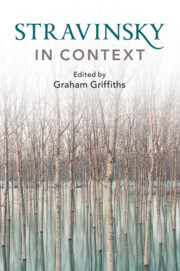Book contents
- Stravinsky in Context
- Composers in Context
- Stravinsky in Context
- Copyright page
- Contents
- Illustrations
- Contributors
- Preface
- Abbreviations
- Frontispiece
- Epigraph
- Part I Russia and Identity
- Part II Stravinsky and Europe
- Part III Partnerships and Authorship
- Part IV Performance and Performers
- Part V Aesthetics and Politics
- Chapter 23 Stravinsky versus Literature
- Chapter 24 Stravinsky and Greek Antiquity
- Chapter 25 Stravinsky’s Response to Japonisme
- Chapter 26 Stravinsky, Modernism and Mass Culture
- Chapter 27 Perspectives on Schoenberg and Stravinsky: Adorno and Others
- Chapter 28 Stravinsky’s ‘Problematic’ Political Orientation during the 1920s and 1930s
- Part VI Reception and Legacy
- Recommendations for Further Reading and Research
- Index
- Endmatter
Chapter 28 - Stravinsky’s ‘Problematic’ Political Orientation during the 1920s and 1930s
from Part V - Aesthetics and Politics
Published online by Cambridge University Press: 03 December 2020
- Stravinsky in Context
- Composers in Context
- Stravinsky in Context
- Copyright page
- Contents
- Illustrations
- Contributors
- Preface
- Abbreviations
- Frontispiece
- Epigraph
- Part I Russia and Identity
- Part II Stravinsky and Europe
- Part III Partnerships and Authorship
- Part IV Performance and Performers
- Part V Aesthetics and Politics
- Chapter 23 Stravinsky versus Literature
- Chapter 24 Stravinsky and Greek Antiquity
- Chapter 25 Stravinsky’s Response to Japonisme
- Chapter 26 Stravinsky, Modernism and Mass Culture
- Chapter 27 Perspectives on Schoenberg and Stravinsky: Adorno and Others
- Chapter 28 Stravinsky’s ‘Problematic’ Political Orientation during the 1920s and 1930s
- Part VI Reception and Legacy
- Recommendations for Further Reading and Research
- Index
- Endmatter
Summary
A mixture of circumstances had prompted Stravinsky’s earnest desire to ‘become a good American citizen.’ Notwithstanding the tragic and destabilising personal state of affairs that faced the composer in the late 1930s as a result of the deaths within the space of only a few months of his first wife, mother and eldest daughter, professional reasons drove him to seek sanctuary across the Atlantic. At that time, it was primarily American institutions that were commissioning new works from him. Furthermore, Stravinsky realised that with the outbreak of war, further composing and performing opportunities in Europe would be severely limited. No less undermining was his increasingly cool relationship with his second adopted country, France. Having lived in the country for well over a decade with a stateless passport, Stravinsky had eventually secured French citizenship in 1934. Yet in the following year he felt humiliated at the way the French establishment had treated him after his candidature to replace the recently deceased Paul Dukas as a member of the Académie des Beaux Arts was rejected, with the native-born Frenchman, Florent Schmitt, elected to the post.
- Type
- Chapter
- Information
- Stravinsky in Context , pp. 250 - 258Publisher: Cambridge University PressPrint publication year: 2020

